Mineral Ascorbates
Summary - A mineral ascorbate is vitamin C bound to one or more minerals, usually calcium, magnesium, and/or sodium. They are used by those who want vitamin C in a non-acidic form, to consume beneficial minerals in a highly absorbable form along with vitamin C, and to prevent mineral depletion when using high-dose vitamin C therapy.
They come in two types, reacted and non-reacted. Non-reacted types are powders or crystals which must be mixed in water to effervesce before drinking. Reacted types come in powder, capsule, and tablet forms. The reacted powder form is also usually mixed in a liquid to consume, although it does not fizz.
Non-reacted products include
Alacer Emergen-C
American Health Ester-C Effervescent
Now Foods Effer-C
Nutribiotic Hypo-Aller C
Reacted products include
Now Calcium Ascorbate (capsules)
Thorne Research Buffered C (powder)
Now Magnesium Ascorbate (powder)
Nutricology Buffered Vitamin C (capsules)
Source Naturals Magnesium Ascorbate (tablets)
Source Naturals
L-Proline L-Lysine (tablets)
Mineral Ascorbates are vitamin C, the plain form known as ascorbic acid, bound to one or more minerals. These minerals are typically calcium, magnesium, potassium, and/or sodium. Many people prefer mineral ascorbate, also known as buffered, forms of vitamin C since they may be better absorbed, easier on the system since they are non-acidic, and more effective for combatting some maladies. Mineral ascorbates are also useful to supplement minerals like calcium and magnesium. It is generally believed that vitamin C is no better absorbed when in plain ascorbic acid form than as a mineral ascorbate, but that minerals bound to vitamin C are better absorbed than alkaline forms. Another reason mineral ascorbates are used is they prevent mineral depletion when using vitamin C in large amounts. Using ascorbic acid in amounts such as 10g or more per day is sometimes used in cleansing regimens as well as to remove toxic metal deposits in the body. However, it also removes beneficial minerals.
Many mineral ascorbates have relatively small amounts of minerals since it only takes about 1 part of an alkaline mineral like magnesium, calcium, or sodium (in carbonate or bicarbonate form) to fully react 10 parts of ascorbic acid. If one wants to get a lot of vitamin C, such as 3g or more per day, they are an ideal form of both vitamin C and minerals. Since mineral ascorbates are one of the better absorbed forms of minerals, less is needed to achieve the same effects as poorly absorbed forms of these minerals. For example, inexpensive forms of calcium and magnesium like calcium carbonate and magnesium oxide are poorly absorbed by the body. It is better to get 30% RDA of calcium from calcium ascorbate than it is 100% RDA from calcium carbonate since ascorbate form is up to 3 times better absorbed. It is better to get 50% RDA of magnesium from magnesium ascorbate than 100% RDA from magnesium oxide. Plus, one also gets the benefit of supplemental vitamin C.
Reacted vs Non-Reacted Forms of Mineral Ascorbates
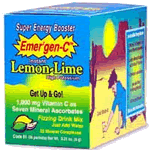 There are two types of mineral ascorbates: Reacted and non-reacted. The most popular non-reacted product is Alacer Emergen-C. Others are American Health Ester-C Effervescent and Now Foods Effer-C. These non-reacted products must be mixed with water (or other liquid) to allow them to effervesce before use. The effervescent reaction produces carbon
There are two types of mineral ascorbates: Reacted and non-reacted. The most popular non-reacted product is Alacer Emergen-C. Others are American Health Ester-C Effervescent and Now Foods Effer-C. These non-reacted products must be mixed with water (or other liquid) to allow them to effervesce before use. The effervescent reaction produces carbon 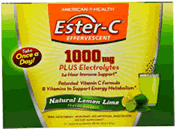 dioxide bubbles as the ascorbic acid reacts with the alkaline minerals to form mineral ascorbates. The non-reacted type can also come in large tablets (similar to Alka-Seltzer) meant to be added to water to effervesce although these non-reacted wafer products are rare. One does not want to make the mistake of chewing or swallowing a non-reacted wafer or powder without first adding to water to let it effervesce since if it occurs in the stomach, it is a gassy experience!
dioxide bubbles as the ascorbic acid reacts with the alkaline minerals to form mineral ascorbates. The non-reacted type can also come in large tablets (similar to Alka-Seltzer) meant to be added to water to effervesce although these non-reacted wafer products are rare. One does not want to make the mistake of chewing or swallowing a non-reacted wafer or powder without first adding to water to let it effervesce since if it occurs in the stomach, it is a gassy experience!
Another non-reacted mineral ascorbate powder is Nutribiotic Hypo-Aller C. The Nutribiotic Company, best known for their grapefruit seed extracts and protein powders, also makes a line of excellent ascorbate powders and other vitamin C and mineral supplements (reacted and non-reacted) including Sodium Ascorbate, Buffered Electro-C, Hypo-Aller-C, Meta-C, Essential Electrolytes and plain Ascorbic Acid. If 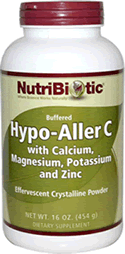 budget is an issue, the Hypo-Aller-C is the best effervescent formula for the money. It is a pound of powder which comes in a canister. It has a similar formula to the reacted Thorne Research product described below, and each teaspoon contains 350mg each of calcium and magnesium, 2600mg vitamin C, 99mg potassium, plus 6mg zinc.
budget is an issue, the Hypo-Aller-C is the best effervescent formula for the money. It is a pound of powder which comes in a canister. It has a similar formula to the reacted Thorne Research product described below, and each teaspoon contains 350mg each of calcium and magnesium, 2600mg vitamin C, 99mg potassium, plus 6mg zinc.
There are many more mineral ascorbates products which are are fully-reacted, where the ascorbate reaction has already occurred. With this type, it is possible to have the product in capsule or tablet, as well as powdered form. Even though no reaction occurs, the powdered type is usually still mixed in water or juice to make it easier to consume. These are available in single mineral forms, such as calcium ascorbate, magnesium ascorbate, sodium ascorbate, and potassium ascorbate. They are often available in combinations with calcium, magnesium, and potassium ascorbates. 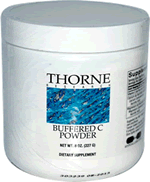
One such combination is Thorne Research Buffered C Powder. It contains per serving 350mg each of calcium and magnesium, 99mg potassium, and 2350mg (2.35g) vitamin C. This is an excellent product to supplement calcium, magnesium, and vitamin C. It should normally only be used one serving per day due to the high mineral content, although using it twice per day to get almost 5g of vitamin C is probably okay short term (it will stimulate elimination due to the large amount of vitamin C and magnesium). Be sure to drink plenty of water when using any mineral supplement.
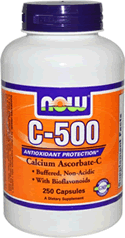 Another example of the fully-reacted form is Ester-C (reacted), which is calcium ascorbate. Even when Ester-C
comes in powder form, it is usually already reacted, unlike the recommended American Health product above, although people who don't like to use capsules or tablets may prefer it in a powder anyway. The trademark Ester-C is licensed to many different manufacturers and used in a wide variety of products. Many supplement manufacturers make their own calcium ascorbate without licensing the Ester-C name. That is so they can make their products more affordable. A good example of this is Now C-500 Calcium Ascorbate-C. Each capsule contains 500mg of vitamin C and 55mg calcium and
Another example of the fully-reacted form is Ester-C (reacted), which is calcium ascorbate. Even when Ester-C
comes in powder form, it is usually already reacted, unlike the recommended American Health product above, although people who don't like to use capsules or tablets may prefer it in a powder anyway. The trademark Ester-C is licensed to many different manufacturers and used in a wide variety of products. Many supplement manufacturers make their own calcium ascorbate without licensing the Ester-C name. That is so they can make their products more affordable. A good example of this is Now C-500 Calcium Ascorbate-C. Each capsule contains 500mg of vitamin C and 55mg calcium and 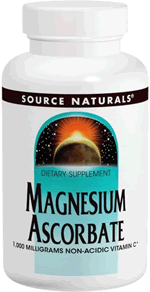 10mg citrus bioflavonoids. A large canister of 250 capsules is inexpensive.
10mg citrus bioflavonoids. A large canister of 250 capsules is inexpensive.
Since calcium is much easier to get in the diet than magnesium, many people prefer to use magnesium ascorbate instead of calcium ascorbate if they are using a single mineral ascorbate. Source Naturals Magnesium Ascorbate are tablets which contain 1000mg vitamin C with 77mg magnesium and 100mg bioflavonoids. The description of the product says "Vitamin C's importance has been established: heart, joints, brain, skin, and immune system health; antioxidant activities; and support for healthy aging. Magnesium is one of the most beneficial minerals known to man, responsible for over 300 metabolic reactions in the body. But even with these unquestioned benefits, many people find vitamin C to be harsh on the stomach. Source Naturals presents Magnesium Ascorbate, a buffered, non-acidic, easy-on-the stomach form of vitamin C in a 1,000 mg tablet that delivers all of the benefits of magnesium and vitamin C and none of the drawbacks."
Unless there's a need to only use a single mineral ascorbate to get only calcium or magnesium, or there is an 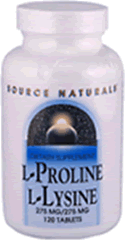 aversion to using a powdered supplement, Electroherbalism recommends using the Thorne Research Buffered-C for a reacted type or the NutriBiotic Hypo-Aller-C for a non-reacted fizzy type.
aversion to using a powdered supplement, Electroherbalism recommends using the Thorne Research Buffered-C for a reacted type or the NutriBiotic Hypo-Aller-C for a non-reacted fizzy type.
Another product that contains mineral ascorbates is worth mentioning since it is highly recommended by Electroherbalism for heart and circulation health. It is Source Naturals L-Proline L-Lysine. It contains, per 4 tablets, 1150mg vitamin C, 66mg calcium, 46mg magnesium, 1100mg lysine, 1100mg proline, 100mg grape seed extract, and 100mg hawthorn berry extract. Vitamin C along with lysine is recommended by the Linus Pauling Institute to reduce arterial plaque and provide other heart and circulation benefits. Proline is often recommended along with lysine since it may provide even more benefits than lysine. If heart health is the main reason someone is looking into using mineral ascorbates, this may be a better product. Lysine and proline may also fight some viral illnesses, especially herpes viruses, better than vitamin C alone.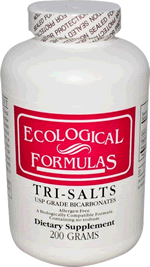
DIY Mineral Ascorbates
One can make mineral ascorbates by mixing vitamin C ascorbic acid (crystals or powder) with bicarbonate or carbonate forms of minerals in water. Like all the non-reacted products, a 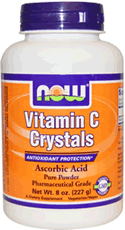 mixture like this must be mixed in liquid to let it effervesce before consuming. This may be less expensive, but the main reason would be if one desired a specific amount of any of the ingredients or to adjust the pH, perhaps to make it more alkaline than regular combinations. The best product to use for a basic combination of calcium, magnesium, and potassium is Ecological Formula's Tri-Salt Bicarbonates along with any good ascorbic acid product, like Now Vitamin C Crystals. Per half teaspoon, Tri-Salts contains 450mg calcium (from carbonate), 250mg magnesium (from carbonate), and 99mg potassium (from bicarbonate), and very inexpensive, as is ascorbic acid. A half teaspoon of ascorbic acid is 2250mg (2.25g). Using a half teaspoon of each will yield an alkaline mixture. Using a teaspoon of vitamin C crystals with a half teaspoon of Tri-Salts will be closer to neutral but still be on the alkaline side.
mixture like this must be mixed in liquid to let it effervesce before consuming. This may be less expensive, but the main reason would be if one desired a specific amount of any of the ingredients or to adjust the pH, perhaps to make it more alkaline than regular combinations. The best product to use for a basic combination of calcium, magnesium, and potassium is Ecological Formula's Tri-Salt Bicarbonates along with any good ascorbic acid product, like Now Vitamin C Crystals. Per half teaspoon, Tri-Salts contains 450mg calcium (from carbonate), 250mg magnesium (from carbonate), and 99mg potassium (from bicarbonate), and very inexpensive, as is ascorbic acid. A half teaspoon of ascorbic acid is 2250mg (2.25g). Using a half teaspoon of each will yield an alkaline mixture. Using a teaspoon of vitamin C crystals with a half teaspoon of Tri-Salts will be closer to neutral but still be on the alkaline side.
It is not recommended to store large amounts of homemade mineral ascorbates pre-mixed powder without using dessicant packets in the mixture (those little packets that absorb moisture and say "Do Not Eat!") unless one lives in a dry climate. Non-reacted mineral ascorbates mixtures (including the ones recommended above) absorb a lot of moisture from the air and this will turn them into a rock in a few months unless the container in which they are stored is airtight and dessicant packets are used.
Large amounts of bulk ingredients used to make mineral ascorbates can be purchased from Bulk Supplements. They carry amounts from 100g up to 25kg with the price for 500g (a little more than a pound) very reasonable for all the ingredients. These include ascorbic acid, calcium carbonate, and magnesium carbonate. To make sodium ascorbate, one can use ascorbic acid crystals with food grade baking soda.

Links The Bioavailability of Different Forms of Vitamin C describes how well various forms of the vitamin are used in the body. |